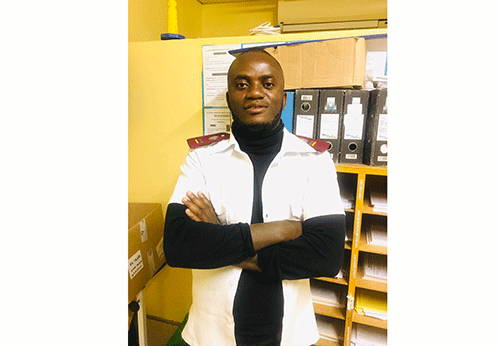Junias Tileinge Shilunga is one of the young men who did not let the societal perception - about nursing being an occupation for women – deter him from accomplishing his dream.
Though there have always been male practitioners, young men are still shying away from this profession.
This is due to the archetypal perception that nursing is too feminine, and that it does not fit the masculine characteristics of dominance and aggression.
Hence, most men rather pursue other medical degrees.
But this societal blindness did not deter the 26-year-old Shilunga from becoming a nurse.
From the onset, he always wanted to become a public health nurse.
And to attain his dream, he enrolled at the University of Namibia’s Oshakati Campus for an honours degree in nursing sciences, which he completed in 2017.
He currently works as a registered nurse at the Khorixas district hospital in the Kunene region after joining the public service in August 2018.
“I was motivated to join the public service due to the critical shortage of nurses in our public hospitals. Public healthcare is overwhelmed due to the high number of patients received daily. I felt it was vital that I could join the public service to help our vulnerable people who depend on public healthcare, and cannot afford or access the private health facilities,” Shilunga said about his motivation.
“I was driven by the fact that I would be rendering my service to the poor and the downtrodden masses of our society. That’s all, I wanted to help the vulnerable people in our communities.”
He was born and grew up in the small village of Enghandja in the Ohangwena region. He attended his primary grades at Onangwe Combined School in the Ondobe Circuit. Later, he moved to the Haimbili Haufiku Secondary School, where he completed his Grade 12.
“My daily responsibilities as a registered nurse are to treat and care for and administer medication to my patients. I also render nursing interventions at different phases of patients’ sick conditions,” he explained.
Nursing is a noble profession that caters for the infirm, wounded, and even the dying. Nurses like Shilunga are thus the backbone of the Namibian healthcare system as primary caregivers in hospitals and clinics across the country. They have been at the frontline since the outbreak of Covid-19, ensuring that public healthcare does not collapse.
Therefore, Shilunga pays tribute to his colleagues, and proclaims that “all nurses are heroes! They have all sacrificed to put their lives and the lives of their families on the line to save the nation during this crucial period of the Covid-19 pandemic. We must salute them for their bravery.”
But public health nurses often come under severe scrutiny from angry and frustrated patients about their dreadful experiences at public hospitals and clinics. However, Shilunga believes public health nurses are the healthcare champions.
“If those of us who work in public service were unproductive and inefficient, we wouldn’t have a functional public healthcare system today. We are the most hardworking people, despite limited resources at our disposal,” he observed, adding that “there are a lot of challenges in this profession. Looking at the economic status of our country, you sometimes find a low supply of critical medications or medical equipment which is essential in quality patient care. This can frustrate and demotivate a person sometimes.”
Shilunga is enjoying his passion for caring and nurturing, and some moments make him proud to be a nurse.
“My most memorable moment in nursing is when I helped a mother to deliver her twins in my first year of working. They were all in good health, both twins and the mother.
“The other memorable event I have experienced in this profession is the unity among the healthcare workers. I have never seen a united force like this one at the Khorixas district hospital. They make my work easy from the beginning, and this is exactly what I want to see in public service,” he narrated.
For now, Shilunga is content with his calling, and is working to change the widespread perception that nursing is an occupation for women. He wants to see more young men pursuing nursing qualifications.
“I will continue to work as a nurse. I want to serve as an inspiration to young men to join nursing, which is a female-dominated profession. The history of nursing has taught us that nursing was a profession for women. That’s why some patients still refer to nurses as ‘sisters’ - even to male nurses. I want to break that stigma by motivating more young male students to join this profession.”


